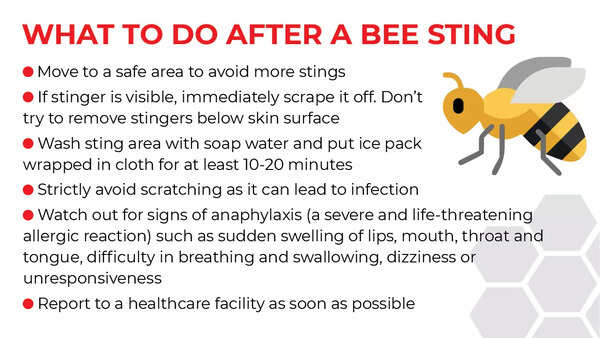‘Heart attacks unusual but bee stings can cause fatal allergic reactions’

Businessman Sunjay Kapur died last week, reportedly from a sudden heart attack after a bee flew into his mouth. Can swallowing a bee cause a fatal heart attack? Preetu Nair speaks to Dr Sabarish B Nair, consultant, emergency medicine and critical care at Amrita Hospital, Kochi to find out how life-threatening a bee or any insect attack can beByline: Preetu NairCan a bee or any insect entering the body cause a heart attack?In Sunjay Kapur’s case, one needs to confirm whether his death was actually caused by a heart attack, and whether the insect was a bee, wasp or hornet. Typically, insect bites lead to varying degrees of allergic reaction related to the bee’s stinger apparatus being inserted into the wound or skin of the human. In most cases, the reaction is mild and subsides with the stinger’s removal. But some may develop anaphylaxis, a severe form of allergy which can be life-threatening if untreated. Anecdotal reports of myocardial infarctions (heart attacks) following bee and wasp stings have been reported, usually days to weeks after a sting, with the infarction developing as a part of a hypersensitive or allergic response. While anaphylaxis is a known complication of a bee sting, dying of a heart attack after a bee sting is unlikely.How to prevent deaths due to bee, wasp or other insect bites?Preventive measures include avoiding hives, not handling hives unless trained, and using protective gear for the face and body to prevent stings while handling hives or bees. To prevent death during any cardiac emergency, one must initiate cardiopulmonary resuscitation (chest compressions and rescue breaths) immediately, whether the cause is an insect sting or primary cardiac arrest. When in a high-risk area, wear tight, light-coloured, long-sleeved clothes. When dealing with plants or moving around in gardens, don’t wear clothes with bright flower patterns. Avoid using perfumes, soaps, or shampoos with attractive smells. Be cautious when you move around materials/plants (cloves, dandelions, open sweet drinks, etc.) which attract bees and wasps.

There have been recent reports of deaths due to wasp/bee stings in Kerala. What’s the possible reason?One of the most probable reasons is intentional or accidental disturbance to the hives by humans, often resulting in multiple stings which turn fatal. Other factors include an overlap between human activity and insect habitats, especially in tourism hotspots, environmental/ ecological factors, and habitat changes. Lack of awareness and preventive measures equally contribute. One must never attempt to remove hives near homes or workplaces without adequate protection or training. Instead, one must call the fire services and the forest department.Who is at risk of complications due to bee/wasp stings?Beekeepers, honey collectors/agricultural and forest workers, besides those who have a previous history of allergic reactions to bee/wasp stings. Also children, older adults, people with heart/lung disease (coronary artery disease, asthma etc) and immunocompromised patients.What life-saving measures can be taken for bee stings?Adrenaline auto injectors, a pre-filled device which can deliver a fast dose of adrenaline (life-saving drug in treating anaphylaxis) to a victim, can be a very effective first aid tool for those with proven anaphylaxis in the past. Unfortunately, availability is a huge challenge.





